Report: Business Law Analysis of Contract Formation and Breach Issues
VerifiedAdded on 2023/02/01
|9
|1829
|30
Report
AI Summary
This business law report examines critical aspects of contract law, including the formation of contracts, breaches of contract, and the implications of exclusion clauses. The report begins by analyzing a scenario involving Hercules and Xena, focusing on whether a valid contract was formed and the validity of acceptance. It then delves into damages for breach of contract, exploring the legal rules governing compensation for losses incurred due to a contract violation. Finally, the report addresses exclusion clauses, determining whether a party can limit their liability through such clauses. Each section provides a detailed analysis of the relevant legal rules, their application to the given scenarios, and the conclusions drawn from the analysis. The report incorporates case law to support its arguments and provides a comprehensive understanding of the legal principles involved. The assignment also includes an analysis of a scenario in which Hercules seeks car repairs, and the implications of the mechanic's failure to meet the agreed-upon timeframe.
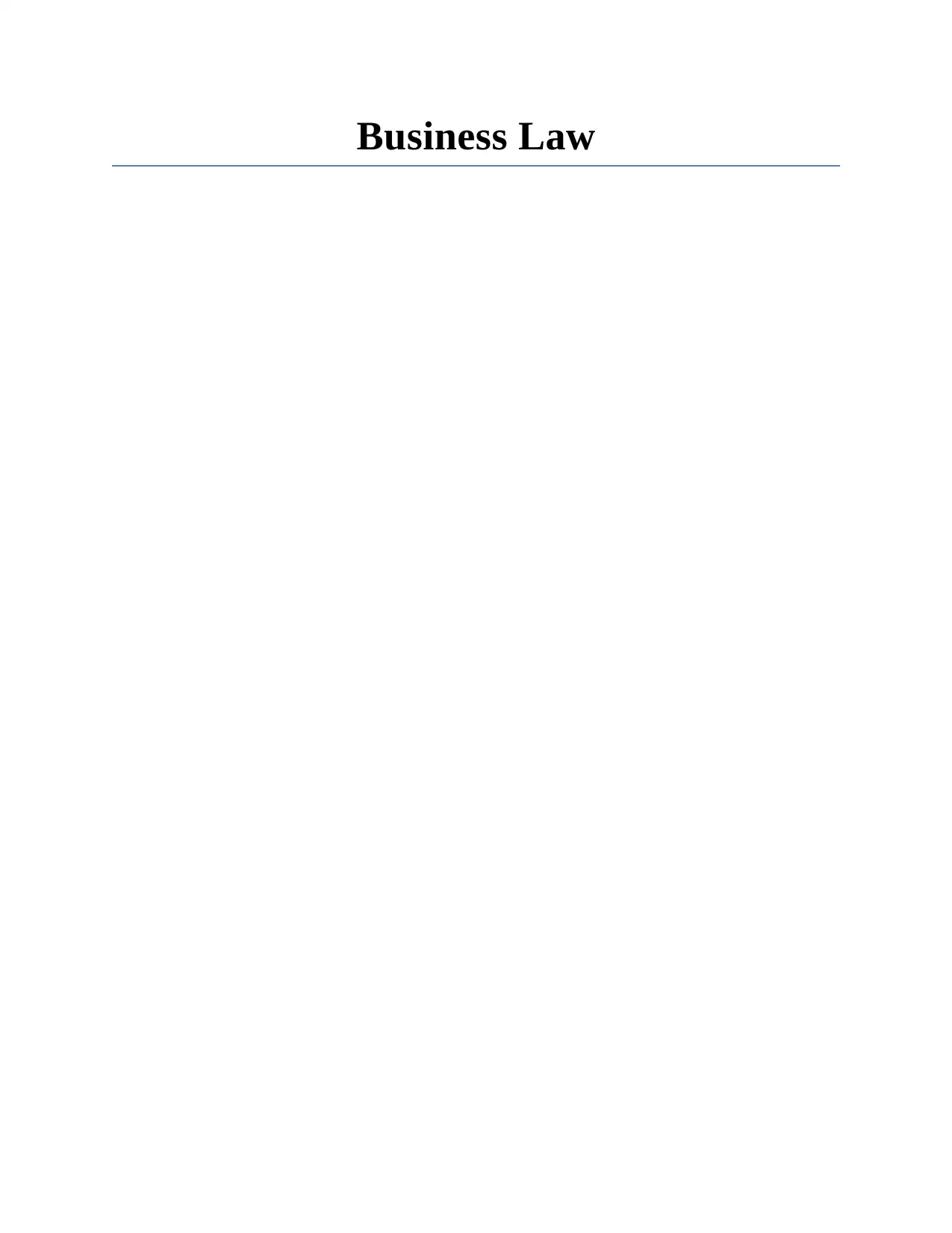
Business Law
Paraphrase This Document
Need a fresh take? Get an instant paraphrase of this document with our AI Paraphraser
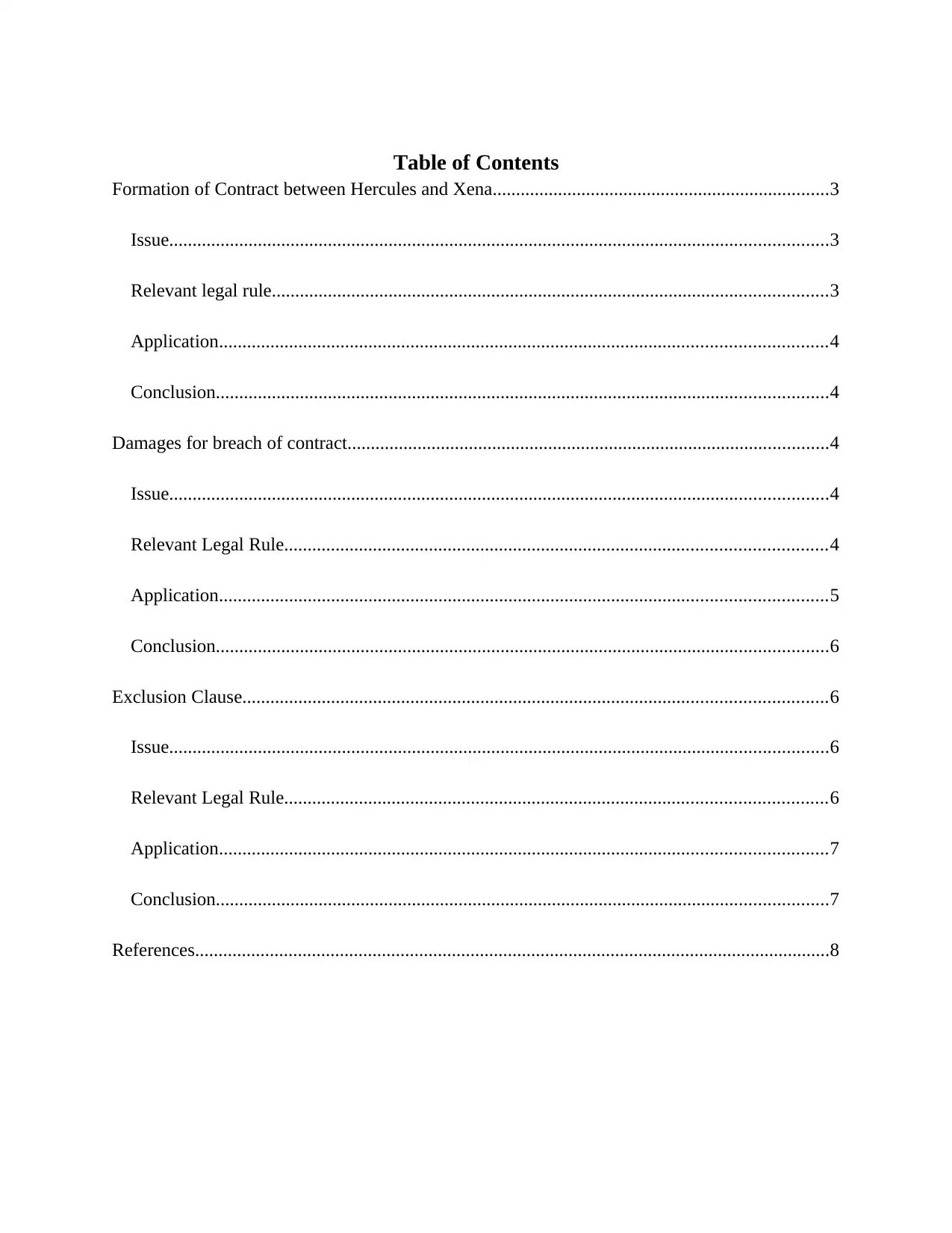
Table of Contents
Formation of Contract between Hercules and Xena........................................................................3
Issue.............................................................................................................................................3
Relevant legal rule.......................................................................................................................3
Application..................................................................................................................................4
Conclusion...................................................................................................................................4
Damages for breach of contract.......................................................................................................4
Issue.............................................................................................................................................4
Relevant Legal Rule....................................................................................................................4
Application..................................................................................................................................5
Conclusion...................................................................................................................................6
Exclusion Clause.............................................................................................................................6
Issue.............................................................................................................................................6
Relevant Legal Rule....................................................................................................................6
Application..................................................................................................................................7
Conclusion...................................................................................................................................7
References........................................................................................................................................8
Formation of Contract between Hercules and Xena........................................................................3
Issue.............................................................................................................................................3
Relevant legal rule.......................................................................................................................3
Application..................................................................................................................................4
Conclusion...................................................................................................................................4
Damages for breach of contract.......................................................................................................4
Issue.............................................................................................................................................4
Relevant Legal Rule....................................................................................................................4
Application..................................................................................................................................5
Conclusion...................................................................................................................................6
Exclusion Clause.............................................................................................................................6
Issue.............................................................................................................................................6
Relevant Legal Rule....................................................................................................................6
Application..................................................................................................................................7
Conclusion...................................................................................................................................7
References........................................................................................................................................8
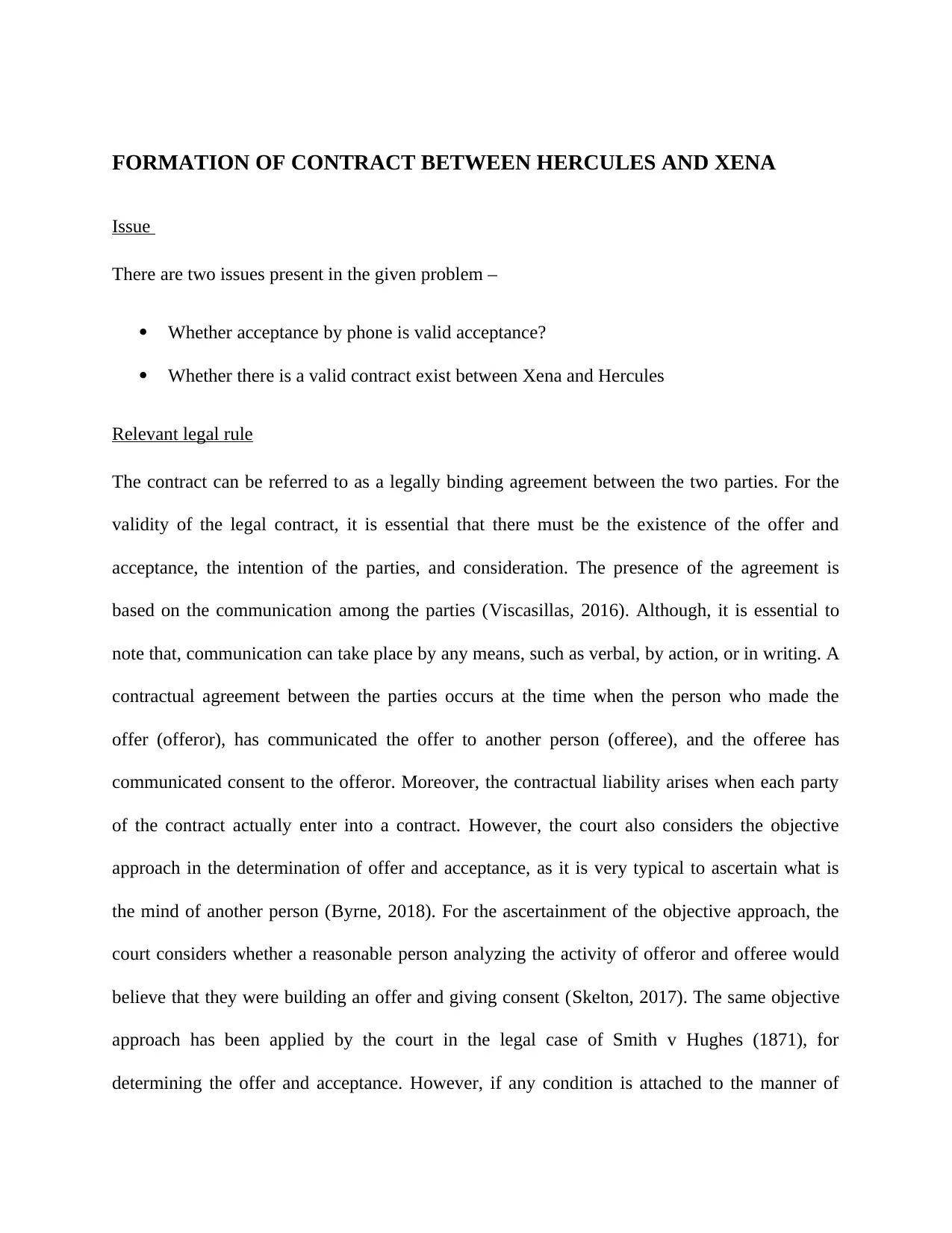
FORMATION OF CONTRACT BETWEEN HERCULES AND XENA
Issue
There are two issues present in the given problem –
Whether acceptance by phone is valid acceptance?
Whether there is a valid contract exist between Xena and Hercules
Relevant legal rule
The contract can be referred to as a legally binding agreement between the two parties. For the
validity of the legal contract, it is essential that there must be the existence of the offer and
acceptance, the intention of the parties, and consideration. The presence of the agreement is
based on the communication among the parties (Viscasillas, 2016). Although, it is essential to
note that, communication can take place by any means, such as verbal, by action, or in writing. A
contractual agreement between the parties occurs at the time when the person who made the
offer (offeror), has communicated the offer to another person (offeree), and the offeree has
communicated consent to the offeror. Moreover, the contractual liability arises when each party
of the contract actually enter into a contract. However, the court also considers the objective
approach in the determination of offer and acceptance, as it is very typical to ascertain what is
the mind of another person (Byrne, 2018). For the ascertainment of the objective approach, the
court considers whether a reasonable person analyzing the activity of offeror and offeree would
believe that they were building an offer and giving consent (Skelton, 2017). The same objective
approach has been applied by the court in the legal case of Smith v Hughes (1871), for
determining the offer and acceptance. However, if any condition is attached to the manner of
Issue
There are two issues present in the given problem –
Whether acceptance by phone is valid acceptance?
Whether there is a valid contract exist between Xena and Hercules
Relevant legal rule
The contract can be referred to as a legally binding agreement between the two parties. For the
validity of the legal contract, it is essential that there must be the existence of the offer and
acceptance, the intention of the parties, and consideration. The presence of the agreement is
based on the communication among the parties (Viscasillas, 2016). Although, it is essential to
note that, communication can take place by any means, such as verbal, by action, or in writing. A
contractual agreement between the parties occurs at the time when the person who made the
offer (offeror), has communicated the offer to another person (offeree), and the offeree has
communicated consent to the offeror. Moreover, the contractual liability arises when each party
of the contract actually enter into a contract. However, the court also considers the objective
approach in the determination of offer and acceptance, as it is very typical to ascertain what is
the mind of another person (Byrne, 2018). For the ascertainment of the objective approach, the
court considers whether a reasonable person analyzing the activity of offeror and offeree would
believe that they were building an offer and giving consent (Skelton, 2017). The same objective
approach has been applied by the court in the legal case of Smith v Hughes (1871), for
determining the offer and acceptance. However, if any condition is attached to the manner of
⊘ This is a preview!⊘
Do you want full access?
Subscribe today to unlock all pages.

Trusted by 1+ million students worldwide
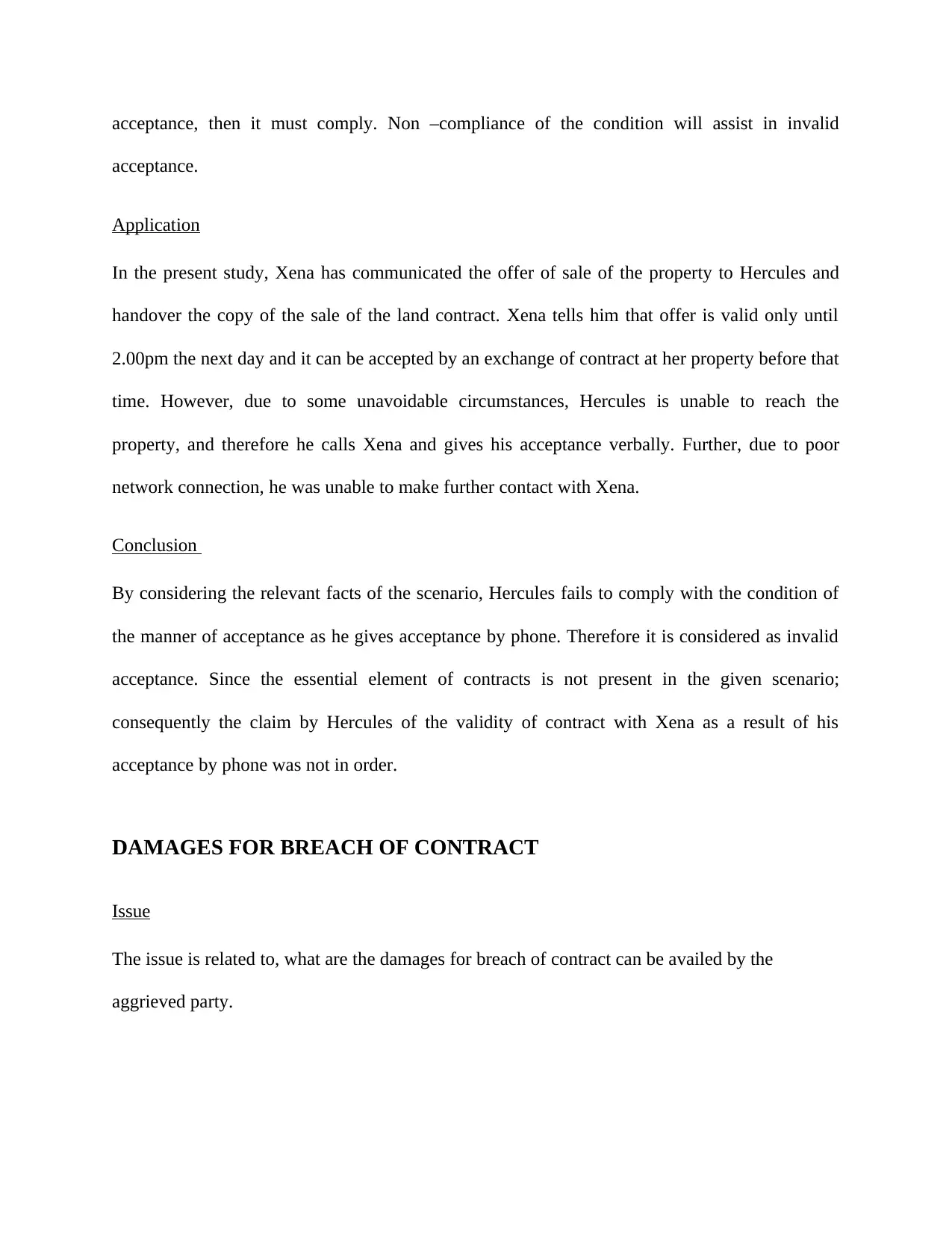
acceptance, then it must comply. Non –compliance of the condition will assist in invalid
acceptance.
Application
In the present study, Xena has communicated the offer of sale of the property to Hercules and
handover the copy of the sale of the land contract. Xena tells him that offer is valid only until
2.00pm the next day and it can be accepted by an exchange of contract at her property before that
time. However, due to some unavoidable circumstances, Hercules is unable to reach the
property, and therefore he calls Xena and gives his acceptance verbally. Further, due to poor
network connection, he was unable to make further contact with Xena.
Conclusion
By considering the relevant facts of the scenario, Hercules fails to comply with the condition of
the manner of acceptance as he gives acceptance by phone. Therefore it is considered as invalid
acceptance. Since the essential element of contracts is not present in the given scenario;
consequently the claim by Hercules of the validity of contract with Xena as a result of his
acceptance by phone was not in order.
DAMAGES FOR BREACH OF CONTRACT
Issue
The issue is related to, what are the damages for breach of contract can be availed by the
aggrieved party.
acceptance.
Application
In the present study, Xena has communicated the offer of sale of the property to Hercules and
handover the copy of the sale of the land contract. Xena tells him that offer is valid only until
2.00pm the next day and it can be accepted by an exchange of contract at her property before that
time. However, due to some unavoidable circumstances, Hercules is unable to reach the
property, and therefore he calls Xena and gives his acceptance verbally. Further, due to poor
network connection, he was unable to make further contact with Xena.
Conclusion
By considering the relevant facts of the scenario, Hercules fails to comply with the condition of
the manner of acceptance as he gives acceptance by phone. Therefore it is considered as invalid
acceptance. Since the essential element of contracts is not present in the given scenario;
consequently the claim by Hercules of the validity of contract with Xena as a result of his
acceptance by phone was not in order.
DAMAGES FOR BREACH OF CONTRACT
Issue
The issue is related to, what are the damages for breach of contract can be availed by the
aggrieved party.
Paraphrase This Document
Need a fresh take? Get an instant paraphrase of this document with our AI Paraphraser
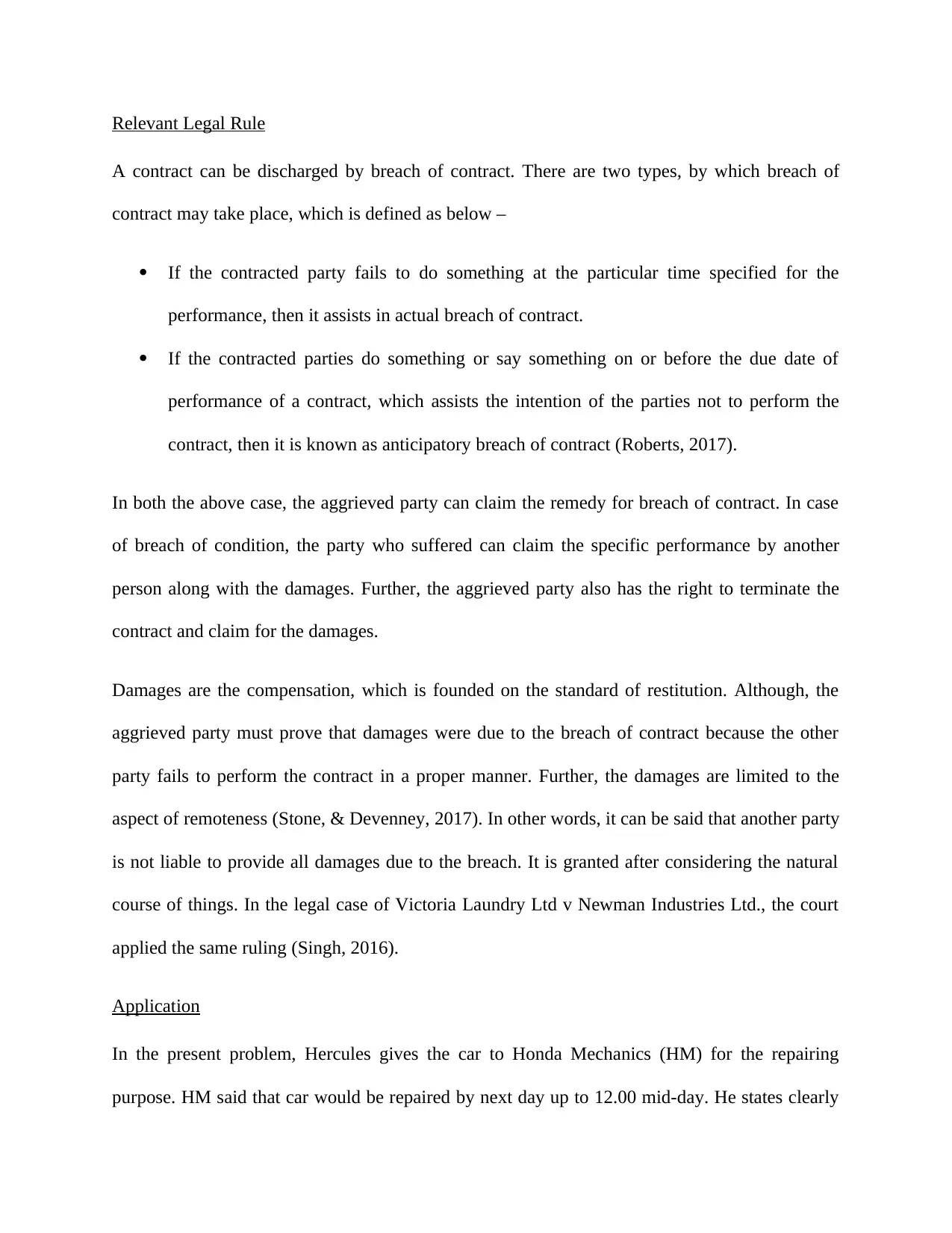
Relevant Legal Rule
A contract can be discharged by breach of contract. There are two types, by which breach of
contract may take place, which is defined as below –
If the contracted party fails to do something at the particular time specified for the
performance, then it assists in actual breach of contract.
If the contracted parties do something or say something on or before the due date of
performance of a contract, which assists the intention of the parties not to perform the
contract, then it is known as anticipatory breach of contract (Roberts, 2017).
In both the above case, the aggrieved party can claim the remedy for breach of contract. In case
of breach of condition, the party who suffered can claim the specific performance by another
person along with the damages. Further, the aggrieved party also has the right to terminate the
contract and claim for the damages.
Damages are the compensation, which is founded on the standard of restitution. Although, the
aggrieved party must prove that damages were due to the breach of contract because the other
party fails to perform the contract in a proper manner. Further, the damages are limited to the
aspect of remoteness (Stone, & Devenney, 2017). In other words, it can be said that another party
is not liable to provide all damages due to the breach. It is granted after considering the natural
course of things. In the legal case of Victoria Laundry Ltd v Newman Industries Ltd., the court
applied the same ruling (Singh, 2016).
Application
In the present problem, Hercules gives the car to Honda Mechanics (HM) for the repairing
purpose. HM said that car would be repaired by next day up to 12.00 mid-day. He states clearly
A contract can be discharged by breach of contract. There are two types, by which breach of
contract may take place, which is defined as below –
If the contracted party fails to do something at the particular time specified for the
performance, then it assists in actual breach of contract.
If the contracted parties do something or say something on or before the due date of
performance of a contract, which assists the intention of the parties not to perform the
contract, then it is known as anticipatory breach of contract (Roberts, 2017).
In both the above case, the aggrieved party can claim the remedy for breach of contract. In case
of breach of condition, the party who suffered can claim the specific performance by another
person along with the damages. Further, the aggrieved party also has the right to terminate the
contract and claim for the damages.
Damages are the compensation, which is founded on the standard of restitution. Although, the
aggrieved party must prove that damages were due to the breach of contract because the other
party fails to perform the contract in a proper manner. Further, the damages are limited to the
aspect of remoteness (Stone, & Devenney, 2017). In other words, it can be said that another party
is not liable to provide all damages due to the breach. It is granted after considering the natural
course of things. In the legal case of Victoria Laundry Ltd v Newman Industries Ltd., the court
applied the same ruling (Singh, 2016).
Application
In the present problem, Hercules gives the car to Honda Mechanics (HM) for the repairing
purpose. HM said that car would be repaired by next day up to 12.00 mid-day. He states clearly
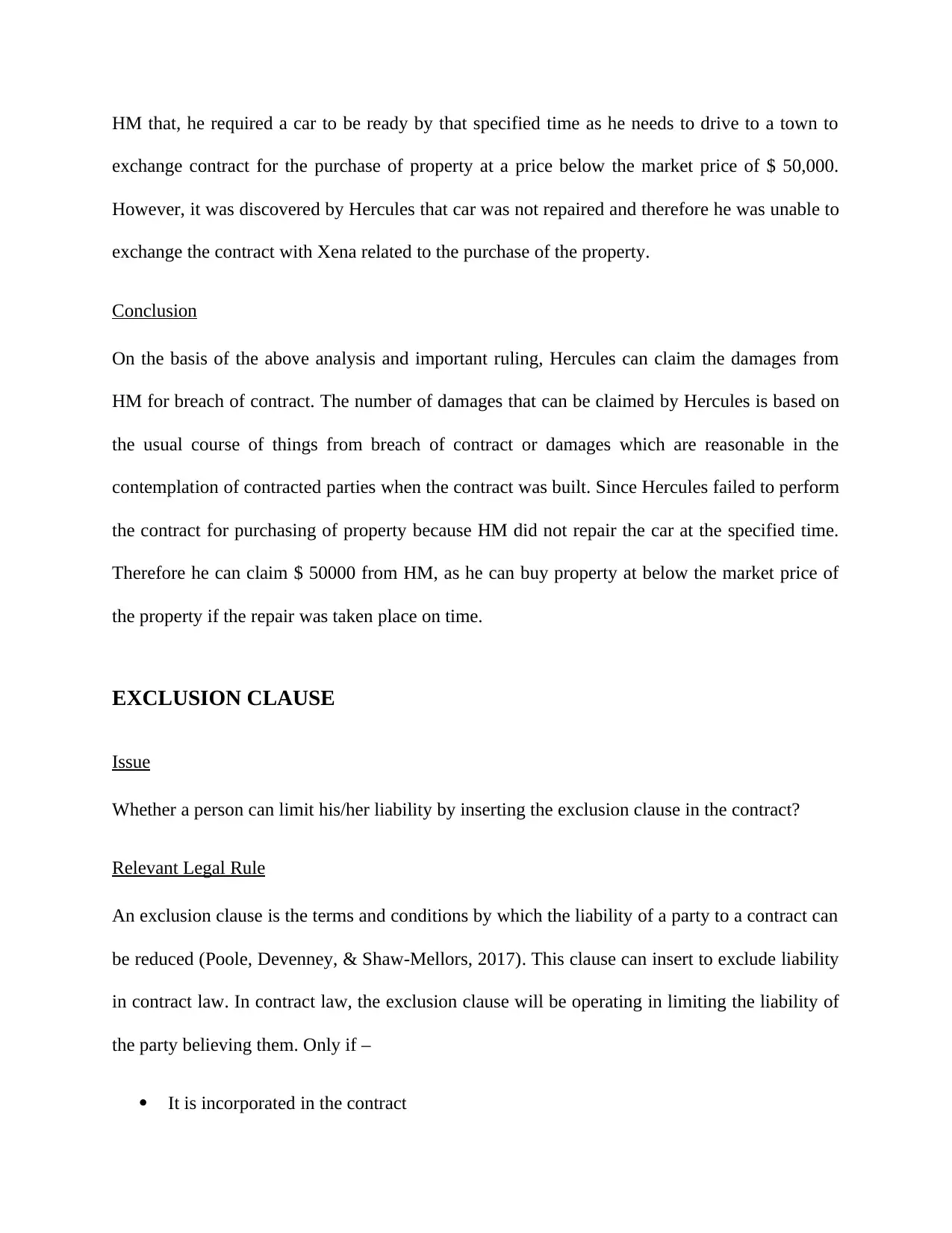
HM that, he required a car to be ready by that specified time as he needs to drive to a town to
exchange contract for the purchase of property at a price below the market price of $ 50,000.
However, it was discovered by Hercules that car was not repaired and therefore he was unable to
exchange the contract with Xena related to the purchase of the property.
Conclusion
On the basis of the above analysis and important ruling, Hercules can claim the damages from
HM for breach of contract. The number of damages that can be claimed by Hercules is based on
the usual course of things from breach of contract or damages which are reasonable in the
contemplation of contracted parties when the contract was built. Since Hercules failed to perform
the contract for purchasing of property because HM did not repair the car at the specified time.
Therefore he can claim $ 50000 from HM, as he can buy property at below the market price of
the property if the repair was taken place on time.
EXCLUSION CLAUSE
Issue
Whether a person can limit his/her liability by inserting the exclusion clause in the contract?
Relevant Legal Rule
An exclusion clause is the terms and conditions by which the liability of a party to a contract can
be reduced (Poole, Devenney, & Shaw-Mellors, 2017). This clause can insert to exclude liability
in contract law. In contract law, the exclusion clause will be operating in limiting the liability of
the party believing them. Only if –
It is incorporated in the contract
exchange contract for the purchase of property at a price below the market price of $ 50,000.
However, it was discovered by Hercules that car was not repaired and therefore he was unable to
exchange the contract with Xena related to the purchase of the property.
Conclusion
On the basis of the above analysis and important ruling, Hercules can claim the damages from
HM for breach of contract. The number of damages that can be claimed by Hercules is based on
the usual course of things from breach of contract or damages which are reasonable in the
contemplation of contracted parties when the contract was built. Since Hercules failed to perform
the contract for purchasing of property because HM did not repair the car at the specified time.
Therefore he can claim $ 50000 from HM, as he can buy property at below the market price of
the property if the repair was taken place on time.
EXCLUSION CLAUSE
Issue
Whether a person can limit his/her liability by inserting the exclusion clause in the contract?
Relevant Legal Rule
An exclusion clause is the terms and conditions by which the liability of a party to a contract can
be reduced (Poole, Devenney, & Shaw-Mellors, 2017). This clause can insert to exclude liability
in contract law. In contract law, the exclusion clause will be operating in limiting the liability of
the party believing them. Only if –
It is incorporated in the contract
⊘ This is a preview!⊘
Do you want full access?
Subscribe today to unlock all pages.

Trusted by 1+ million students worldwide
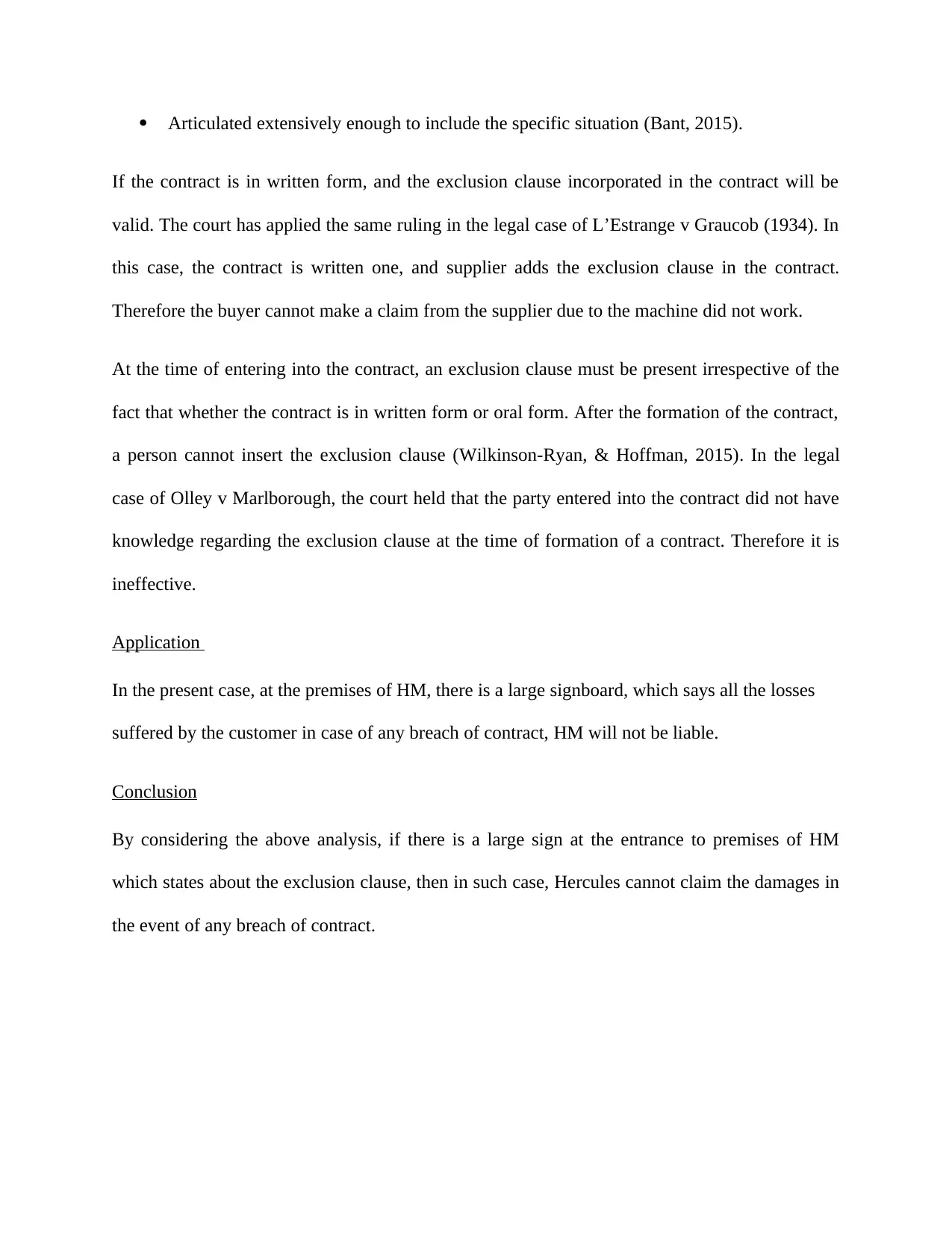
Articulated extensively enough to include the specific situation (Bant, 2015).
If the contract is in written form, and the exclusion clause incorporated in the contract will be
valid. The court has applied the same ruling in the legal case of L’Estrange v Graucob (1934). In
this case, the contract is written one, and supplier adds the exclusion clause in the contract.
Therefore the buyer cannot make a claim from the supplier due to the machine did not work.
At the time of entering into the contract, an exclusion clause must be present irrespective of the
fact that whether the contract is in written form or oral form. After the formation of the contract,
a person cannot insert the exclusion clause (Wilkinson-Ryan, & Hoffman, 2015). In the legal
case of Olley v Marlborough, the court held that the party entered into the contract did not have
knowledge regarding the exclusion clause at the time of formation of a contract. Therefore it is
ineffective.
Application
In the present case, at the premises of HM, there is a large signboard, which says all the losses
suffered by the customer in case of any breach of contract, HM will not be liable.
Conclusion
By considering the above analysis, if there is a large sign at the entrance to premises of HM
which states about the exclusion clause, then in such case, Hercules cannot claim the damages in
the event of any breach of contract.
If the contract is in written form, and the exclusion clause incorporated in the contract will be
valid. The court has applied the same ruling in the legal case of L’Estrange v Graucob (1934). In
this case, the contract is written one, and supplier adds the exclusion clause in the contract.
Therefore the buyer cannot make a claim from the supplier due to the machine did not work.
At the time of entering into the contract, an exclusion clause must be present irrespective of the
fact that whether the contract is in written form or oral form. After the formation of the contract,
a person cannot insert the exclusion clause (Wilkinson-Ryan, & Hoffman, 2015). In the legal
case of Olley v Marlborough, the court held that the party entered into the contract did not have
knowledge regarding the exclusion clause at the time of formation of a contract. Therefore it is
ineffective.
Application
In the present case, at the premises of HM, there is a large signboard, which says all the losses
suffered by the customer in case of any breach of contract, HM will not be liable.
Conclusion
By considering the above analysis, if there is a large sign at the entrance to premises of HM
which states about the exclusion clause, then in such case, Hercules cannot claim the damages in
the event of any breach of contract.
Paraphrase This Document
Need a fresh take? Get an instant paraphrase of this document with our AI Paraphraser
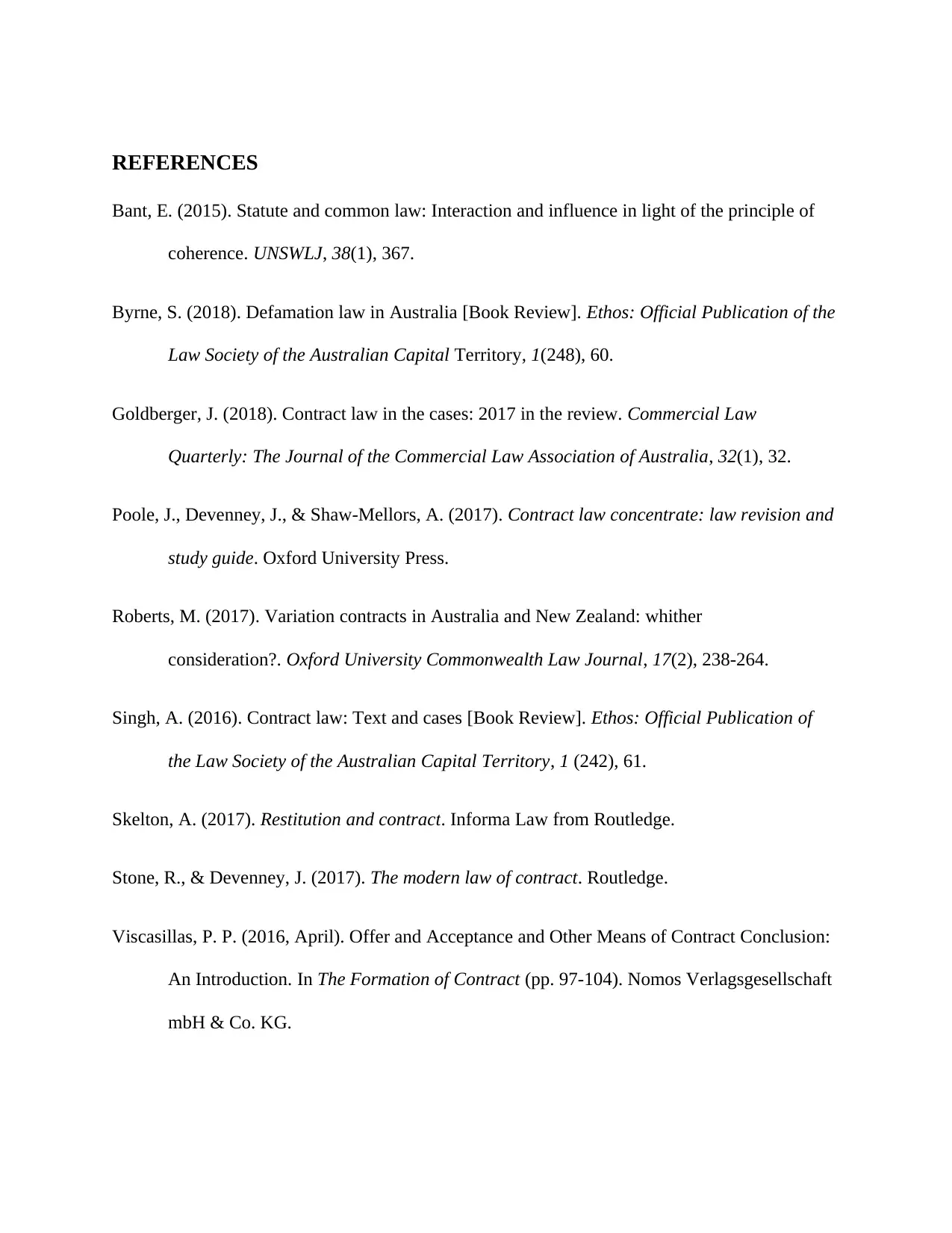
REFERENCES
Bant, E. (2015). Statute and common law: Interaction and influence in light of the principle of
coherence. UNSWLJ, 38(1), 367.
Byrne, S. (2018). Defamation law in Australia [Book Review]. Ethos: Official Publication of the
Law Society of the Australian Capital Territory, 1(248), 60.
Goldberger, J. (2018). Contract law in the cases: 2017 in the review. Commercial Law
Quarterly: The Journal of the Commercial Law Association of Australia, 32(1), 32.
Poole, J., Devenney, J., & Shaw-Mellors, A. (2017). Contract law concentrate: law revision and
study guide. Oxford University Press.
Roberts, M. (2017). Variation contracts in Australia and New Zealand: whither
consideration?. Oxford University Commonwealth Law Journal, 17(2), 238-264.
Singh, A. (2016). Contract law: Text and cases [Book Review]. Ethos: Official Publication of
the Law Society of the Australian Capital Territory, 1 (242), 61.
Skelton, A. (2017). Restitution and contract. Informa Law from Routledge.
Stone, R., & Devenney, J. (2017). The modern law of contract. Routledge.
Viscasillas, P. P. (2016, April). Offer and Acceptance and Other Means of Contract Conclusion:
An Introduction. In The Formation of Contract (pp. 97-104). Nomos Verlagsgesellschaft
mbH & Co. KG.
Bant, E. (2015). Statute and common law: Interaction and influence in light of the principle of
coherence. UNSWLJ, 38(1), 367.
Byrne, S. (2018). Defamation law in Australia [Book Review]. Ethos: Official Publication of the
Law Society of the Australian Capital Territory, 1(248), 60.
Goldberger, J. (2018). Contract law in the cases: 2017 in the review. Commercial Law
Quarterly: The Journal of the Commercial Law Association of Australia, 32(1), 32.
Poole, J., Devenney, J., & Shaw-Mellors, A. (2017). Contract law concentrate: law revision and
study guide. Oxford University Press.
Roberts, M. (2017). Variation contracts in Australia and New Zealand: whither
consideration?. Oxford University Commonwealth Law Journal, 17(2), 238-264.
Singh, A. (2016). Contract law: Text and cases [Book Review]. Ethos: Official Publication of
the Law Society of the Australian Capital Territory, 1 (242), 61.
Skelton, A. (2017). Restitution and contract. Informa Law from Routledge.
Stone, R., & Devenney, J. (2017). The modern law of contract. Routledge.
Viscasillas, P. P. (2016, April). Offer and Acceptance and Other Means of Contract Conclusion:
An Introduction. In The Formation of Contract (pp. 97-104). Nomos Verlagsgesellschaft
mbH & Co. KG.
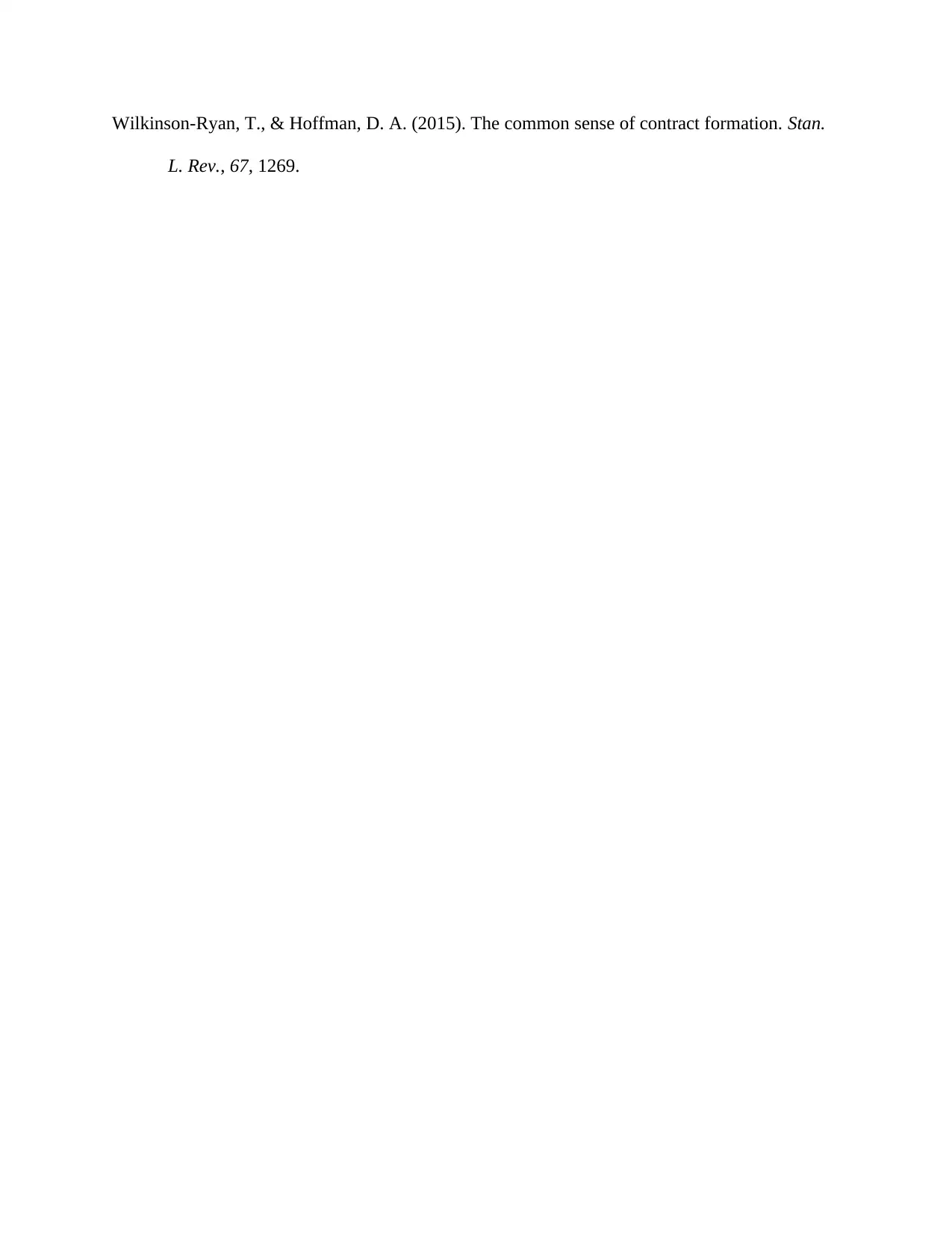
Wilkinson-Ryan, T., & Hoffman, D. A. (2015). The common sense of contract formation. Stan.
L. Rev., 67, 1269.
L. Rev., 67, 1269.
⊘ This is a preview!⊘
Do you want full access?
Subscribe today to unlock all pages.

Trusted by 1+ million students worldwide
1 out of 9
Related Documents
Your All-in-One AI-Powered Toolkit for Academic Success.
+13062052269
info@desklib.com
Available 24*7 on WhatsApp / Email
![[object Object]](/_next/static/media/star-bottom.7253800d.svg)
Unlock your academic potential
Copyright © 2020–2025 A2Z Services. All Rights Reserved. Developed and managed by ZUCOL.




